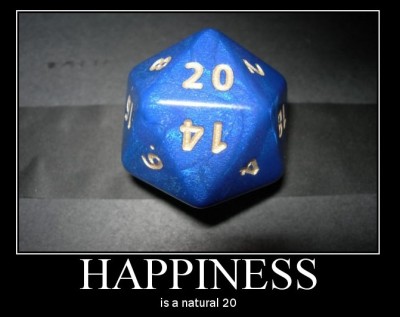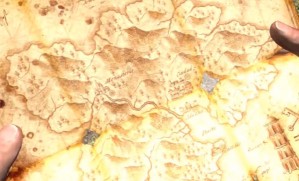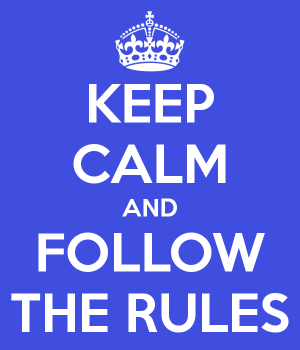I’ve been Dungeon Master-ing for a lot longer than I would care to admit, and at this point I think I’ve got a pretty good handle on it. But there’s a lot going on when you’re in the big seat. You need to know the rules, you need to keep the game moving and most importantly, you need to keep the players having a good time. All of this can be daunting for a rookie DM that has a vague idea of what they’re supposed to be doing.
So in honor of our Multiplayer Issue, we’re getting into the crunchy bits of running one of the classic multiplayer games – Dungeons & Dragons. If you’re looking for tips and tricks for being a better DM, tuck in.
Table Rules
Let’s start with the meta game around the actual table. It is good to have specific house rules for things that players can and can’t do in order to keep the game moving. Here are a couple of my favorites:
1) Do not talk about your characters’ stats or abilities to each other unless it’s relevant.
In D&D everybody rolls (builds) a character. They pick a class and a race and assign stats. Then they build a backstory and give themselves a name and so on. There’s something deeply satisfying for people about creating a new avatar and they will be proud of what their character is capable of.
However, when they talk about their stats/abilities/backgrounds it is natural for some people to want to one up each other, or even worse, for people to lose faith in the character that they have made. If the first happens it can turn into a pissing match and the players become less friendly towards each other. This is bad. The players ideally should be getting along. Hostility of any sort is not what you want around your table. If a player loses faith in their character then they are having less fun because they are envious. The easiest way to avoid all of this is simply squash that as soon as any of it comes up.
2) Players can freely ret-con encounters immediately after the fact.
This is a general storytelling rule. What actually happens is not always what the official record should show. Sometimes an alternative that is better will occur right after the event in question has happened. So an example might be, an orc barbarian leapt from a castle wall and landed really hard, the half elf rogue following him climbed down the ivy the orc wasn’t paying attention to. In the game, that’s how it went down. On retcon, once the Orc hit the ground the elf looked over the wall and shouted, ‘Vines dumb ass.”
Basically, you don’t want to change things that are plot relevant. So don’t undo a character death or anything like that. But instead of just stabbing a dragon the players think, “Oh, man. I should have jumped through the air and sliced off his head like a jabberwocky,” you have it in your power to make that happen. If you do, never change it or bring up the original again. Eventually the players will forget entirely.
If this seems like a strange rule, the effect it has is that it moves the game along. Players won’t argue about the best or coolest way to deal with an encounter. Instead they’ll focus on getting it dealt with, which keeps the pace up.
3) If players are arguing about something, ask somebody else what they would like to do and then do that.
This is a useful table control rule if you have a larger group. It’s possible that somebody will be left out of the proceedings or get talked down. If that’s the case as DM I will interact with them directly. While there are alpha players that want to be in charge, at the end of the day their title doesn’t have “Master” in it – yours does. The more people you keep involved the better your game will be. Besides, the quiet ones are usually full of strange ideas, which are awesome.
4) Let the players roll their own dice.
Some DMs roll all of the dice. This is a method I call “Black Box” since the actions are given, an output is returned, and the players don’t know what the hell went on. Don’t be that guy. If you make the rolls and they are crap the players will blame you. From a math perspective they shouldn’t, but they will anyway, especially if the dice aren’t going their way. On the flip side, rolling up a natural 20 feels awesome. Making the players roll also keeps everybody in the game, which is what most of my table rules are designed to do.
These are just a couple of examples that I keep at my table. As you can see, it’s all about keeping people involved and not fighting with each other. This lets the players focused on what they should – the story.
Game Story Strategy
Let’s get this out of the way right now – if you are trying to write some compelling narrative and you want to express it during a game of D&D you’re going to be wildly disappointed. While you may have an idea, that doesn’t mean basically anything to the players. They wrote characters, they gave them traits and personalities and they are going to use them however they please, often breaking your carefully laid plots in the process. I know, it’s a giant shame, but players do not like the feeling that they are being led. Instead, you’re going to have to rethink how you write a game for D&D.
First, you need to take that sexy 3 act structure that you learned in film school and get rid of it. Instead a good game of D&D is built around the concept of encounters. It helps when you’re writing these encounters to have a path that will connect the pieces. Of course, don’t expect that your path will be on the one that actually happens. This step is mostly for you to help figuring out a logical way that the encounters can link together.

Each encounter, much like a scene in a play or movie, needs a location and some characters. In D&D don’t worry about time of day or any of that, since the concept of time in the game is so malleable. Once you have established the parameters go ahead and give the location some back story. Why is it there? What is the purpose of the place? What is it being used for now? If it’s not being used for what it was built for, what changes have been made? This seems like some work but what you’re doing is giving yourself the tools you need when if you need to improvise. Also, and this is key, make notes when the game is going on. There are few things players love more than coming back and seeing the effects of their adventures/hilarious fuck ups on a place.
Then do the same for the characters that the players might meet. Give them names and short backstories. Nothing too deep if you don’t want to, but enough to give you something to play with. Like locations, if you are riffing with this character and make new information for them, write that down too for next time. Eventually you will have built characters who have history with the players, and are quickly recognizable. Players love that.
For the first encounter it helps if you set up the overarching goal. Maybe the players are cursed. Maybe there’s some kind of evil that is encroaching on the land, or perhaps something that belonged to the characters was stolen. When you do this it creates a situation where the players become active participants in your encounters without them realizing that they’re being subtly led. Basically you’re giving them a reason for going in a direction while making them feel like it’s their idea.
With all of that established, I’ve found encounters work best by simply setting up the scene and letting the players figure out what they would like to do. As the DM you become the facilitator. So you answer questions the players have, you play act the characters that they meet and try to be as descriptive as possible towards their answers. It’s not your job to give everything away. Even though as a DM you wrote all that backstory for a place or a character, that’s just there for you. What you can do is hint that there is more information with your answers, gradually leading the players towards solutions. But do not lore bomb them from orbit, it’s only entertaining to the DM so restrain yourself.

You’ll notice that I didn’t say anything about having the whole thing scripted out. An encounter is like a playground and I find it works best to let the players, you know, play. This is the reason you don’t write a whole bunch of specifics into your encounters. Since the players will probably do something that you didn’t think of, and the encounters don’t always have a default starting point. If a DM creates encounters like I’ve described, they then have the capability to quickly modify the specifics on the fly. Maybe there was a bandit fortress the players encountered. If they can talk their way out of it, maybe they visit as guests. If they don’t maybe they become prisoners. In either case the stuff written for the location and characters is still true. The only thing that has changed is the context.
With that in mind, don’t go crazy with the writing. Three or maybe four encounters are all you need to a good game session. Any more than that and it becomes very difficult to chain the encounters together coherently. Basically the context will start to buckle and you’ll have to make some leaps of logic or happenstance for things to come together. Stick with a lower number, make your notes as you go, and then for the next adventure write a new thing based on the outcome. It’s easier to move the starting point instead of trying to figure out the outcomes of dice rolls and the lovely crazy people around your table.
Tactical Strategy
Fact #1: In D&D there is sometimes a lot of combat. This is especially true after stealth checks are failed.
Fact #2 : DMs are usually gamers. People that play games usually want to win.
Fact #3 : As DM it is your job to lose.
“Well,” you may rhetorically and usefully ask, “How does that work?” The answer is that it’s not your job to try and kill everybody. There is a part of some people that sees a bunch of miniatures and a big book filled with spells and stats and thinks that they want to put together an unbeatable monster squad. Then when faced with the player characters they try to work out the best and most tactically sound way to kill the whole party. In other words, as the DM they begin to play the role of the villain.
I’ll stick this point on its own line because it’s important:
Of all the pitfalls that can happen to a fledgling DM, becoming the villain is the absolute worst.
It sets the wrong mindset for players because you are also responsible for describing outcomes. Playing the tactical portion of the game in an effort to destroy the party is how the game can devolve into a you versus them situation. That’s not what you’re there for; a DM is a game facilitator. While there are probably gaming groups out there that are really into tactics, those DMs probably also have a keen idea about the balance needed for a fair fight. As a beginner it’s easier to avoid the issue altogether.
Instead your job is about making it fun. You do this in combat by not always making the smartest choices in the world. Basically change your mindset from, “How do I win?” to “What is the most interesting thing I can do?” A DM can make this change because the rest of the table is thinking of the answer to that first question. By asking yourself the latter you begin to create a situation where the specifics of the battle are your toys to play with. When a DM looks at a pile of orcs with hunting dogs they shouldn’t be thinking of stats and how hard they hit, but about using those dogs to chase the players on a mad dash through the woods. No player will remember the time they fought a battle with really tactically sound orcs, but they will remember running for their lives and setting up an ambush the orcs then barreled into. Basically, a big part of being DM is knowing how to lose in the most entertaining way possible.

The flip side of that is if you have some kind of boss, go ahead and try harder. It feels good for players to earn those victories. Plus since you’re focusing on playing the boss it will actually increase the difficulty for that fight, which will feel apropos.
Adventure Time
So to sum it all up for your tldr folks out there. Have rules at your table to encourage teamwork and get everybody involved. Don’t write a massive thing because it won’t happen. Create your game in manageable encounters. Always give yourself a way to improvise based on context. Don’t play like the villain. Do what you can to make fights fun instead of trying to win all the time. Of course the best advice is to round up your friends, get some books and dice and just do it.
Get these basic guidelines in your Dungeon Master toolbox and the sky of a thousand worlds become the limit. In the meantime, if there are any tips, tricks or questions you would like to share drop ’em in the comments. Then get out that notebook, because those adventures aren’t going to write themselves.









